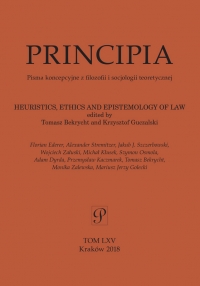The Aristotelian Theory of Adjudication from the Perspective of Dual Process Theory
The Aristotelian Theory of Adjudication from the Perspective of Dual Process Theory
Author(s): Mariusz Jerzy GoleckiSubject(s): Ancient Philosphy, Cognitive Psychology, Philosophy of Law
Published by: Wydawnictwo Uniwersytetu Jagiellońskiego
Keywords: Aristotle; epieikeia (ἐπιείκεια); dual process theory; hybrid model of categorization; heuristics and biases; bounded rationality;
Summary/Abstract: In his theory of adjudication, Aristotle observes that the judicial process should be based on rational and impartial evaluation of the merits of given case and on the application of law. This paper focuses on the bipolar character of the theory of adjudication analyzed from the perspective of the modern dual process theory. It seems that the bounded rationality of judges may create a potential threat to the impartiality and rationality of judgments in complex cases. In this context the hybrid model of categorization adopted from cognitive psychology is to be confronted with the Aristotelian theory of adjudication. The influence of heuristics and biases on judicial decisions is also to be considered. The conclusion refers to the prospects of an Aristotelian virtue centered model of adjudication following the assumption of bounded rationality.
Journal: PRINCIPIA
- Issue Year: 2018
- Issue No: 65
- Page Range: 207-231
- Page Count: 25
- Language: English

